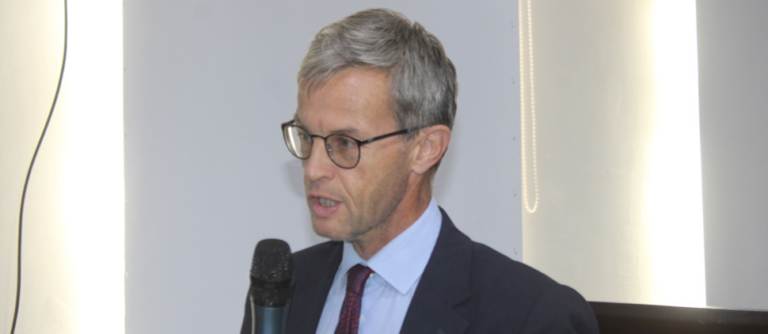The legacies of conflict, displacement, and poverty have made communities across South Sudan more vulnerable to human trafficking, according to the European Union (EU).
Speaking at an event marking the World Day Against Trafficking in Persons (TiP) at the Crown Hotel in Juba on Tuesday, the Acting Head of the European Union Delegation to South Sudan, Lothar Jaschke, noted that women, children, and internally displaced persons were among the worst affected.
Jaschke said the World Day Against Trafficking in Persons brought people across the globe together in the fight against one of the most heinous crimes of our time.
“Taking strong measures against TiP is not only a human rights obligation but also a development imperative,” he said.
The envoy paid tribute to the courage of survivors and the tireless work of those who protect them, noting that migrants and refugees often face extreme weather conditions, legal and regulatory hurdles, financial hardship, discrimination, and xenophobia.
“Many are deprived of basic protection services, leaving them highly vulnerable to exploitation and abuse, including human trafficking. Human trafficking is often invisible, yet its consequences are devastating. Globally, an estimated 27.6 million people are victims of forced labor and sexual exploitation,” he explained.
Jaschke listed the enablers of TiP as the recruitment of children into armed groups—despite national and international prohibitions—and a lack of economic opportunities, particularly outside urban centers, which makes children easy prey.
Forced early marriages, often under the guise of tradition or economic pressure, as well as sexual exploitation and domestic servitude—particularly of girls and women—also fuel TiP.
Jaschke acknowledged that South Sudan had taken important steps against the crime, including adopting its Transitional Constitution (2011), which prohibits slavery, servitude, and forced labor (Article 13).
He added that South Sudan is also a party to key human rights instruments, including the Convention on the Rights of the Child, the African Charter on the Rights and Welfare of the Child, and the Convention on the Elimination of All Forms of Discrimination Against Women.
However, Jaschke noted that challenges remain, including limited institutional capacity for law enforcement, border control, and victim identification.
“The capacities of police, judges, and border officials need to be strengthened to detect, investigate, and prosecute trafficking cases—while respecting due process and victims’ rights,” he said.
He added that customary practices, including bride price and dowry-related negotiations, could be misused to justify child marriage and sexual exploitation, urging engagement with traditional and religious leaders.
Jaschke said the European Union is working closely with UNMISS, UNICEF, IOM, civil society organizations, and local communities in South Sudan to prevent exploitation, protect vulnerable populations, and promote accountability.
“The EU also supports education, livelihoods, and the empowerment of women and youth—all of which are essential to preventing trafficking before it happens,” he said.
Additionally, the EU supports the Regional Operational Center in support of the Khartoum Process (ROCK) in partnership with the African Union. ROCK serves as a hub where law enforcement officers from partner countries—including South Sudan—can engage in face-to-face exchanges, share cross-border information, and carry out joint intelligence operations, leading to the identification and arrest of traffickers and the dismantling of criminal networks.




